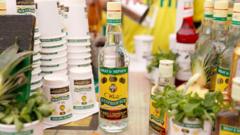The ongoing dispute in Jamaica over the designation of "Jamaica rum" has raised significant questions about authenticity and geographical indications in the rum industry.
What Defines Jamaican Rum? Legal Clash Unfolds in the Caribbean

What Defines Jamaican Rum? Legal Clash Unfolds in the Caribbean
Amid cultural pride and economic stakes, Jamaican rum faces a crucial legal defining moment.
Rum, a quintessential part of Jamaica's heritage, has become the focal point of a contentious debate surrounding the definition of "Jamaica rum." This issue gained traction after amendments to the geographical indication (GI) status were proposed, aimed at clarifying those parameters. The Spirits Pool Association (SPA) is advocating for stricter regulations to prevent rum aged abroad from bearing the esteemed label.
In October 2022, Jamaica's Intellectual Property Office (JIPO) instituted changes to the GI that prohibited the aging of Jamaican rum outside the country. This was primarily driven by the interests of the SPA, representing six local distilleries, including big names like Appleton and Hampden Estate. Their rationale is that strengthening the GI would enhance the recognition of Jamaican rum globally, protecting it from counterfeiting and underscoring its premium quality.
However, this alteration has ignited controversy, particularly from National Rums of Jamaica (NRJ), a significant player in the industry that operates Long Pond and Clarendon distilleries. NRJ asserts that rum aged outside Jamaica should still be categorized as Jamaican, arguing that the practice has been a long-standing tradition. The company is now appealing JIPO's decision, with a hearing set for April 28.
Current debates underscore the cultural implications of rum production, as some producers argue that proper aging within Jamaica is crucial for maintaining the spirit's authenticity. The SPA contends that aging abroad undermines the uniqueness of Jamaican rum, while also depriving the island of potential economic benefits stemming from production processes that should occur locally.
Intellectual property law expert Dev Gangjee notes that products with protected status can command significant price premiums and help preserve regional identities against commoditization. He cites parallel disputes in nearby Barbados, where attempts to define their rum GI have faced opposition, particularly from the same entity that raised concerns in Jamaica.
While the SPA aspires for Jamaican rum to receive the EU’s Protected Geographical Indication classification, progress hinges on the conclusion of the ongoing legal matters. The SPA's hope is that, eventually, a solution will satisfy both factions, rekindling a sense of pride in a product that reflects Jamaica's rich history and identity.
As the debate continues, local media emphasizes the importance of maintaining the integrity of Jamaican rum against foreign encroachment. The Gleaner, a respected Jamaican newspaper, has vocalized support for the JIPO’s amendments, stressing the need for established ties to the nation's heritage in rum production.



